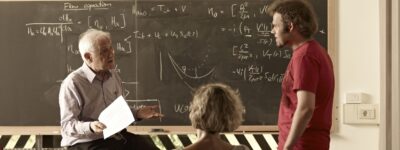Current status of spin hydro based on GLW definitions of energy-momentum and spin tensors

Since the first positive measurement of the Λ-hyperon global spin polarization in heavy-ion collisions by STAR in 2017, the understanding of the nature of this phenomenon is one of the most intriguing challenges for the scientific community. As relativistic fluid dynamics celebrates multiple successes in describing collective dynamics of the QCD matter in such reactions, the natural question arises whether the spin dynamics can also be modelled in such a framework. In this talk, the motivation for and recent outcomes of the experimental hunt for the macroscopic footprints of quantum spin in the relativistic heavy-ion collisions will be presented and the theoretical challenges connected with formulating its collective description will be discussed. In addition, I will present the recent results of the space-time evolution of spin polarization within the framework of hydrodynamics with spin based on the de Groot – van Leeuwen – van Weert forms of energy-momentum and spin tensors in the non-boost invariant background.
The talk will primarily be based on https://arxiv.org/abs/2112.01856.
People
-
Rajeev Singh - SpeakerDepartment of Theory of Structure of Matter (NZ 41), The Henryk Niewodniczanski Institute of Nuclear Physics, Polish Academy of Sciences (IFJ PAN)Rajeev obtained his bachelor's in Electronics and Communication Engineering at the West Bengal University of Technology, India and his M.Sc. in Physics at Pune University where he did research in Quantum Cosmology at the Tata Institute of Fundamental Research. Subsequently, he went to France to the University of Clermont Auvergne for a one-year MS in particle physics where he interned in the LHCb group for 3 months. In October 2018, he joined the group of Profs. Wojciech Florkowski and Radoslaw Ryblewski as a Ph.D. student under the supervision of Prof. Ryblewski. Rajeev's focus is on the physics of heavy-ion collisions, more specifically the formulation of the theory of spin hydrodynamics and 3+1D code for the understanding of spin polarization of Lambda hyperons. He is now in the final year of his PhD. Upon completion, he will move to Stony Brook University for a one-year post-doctoral appointment as a NAWA Bekker Fellow.